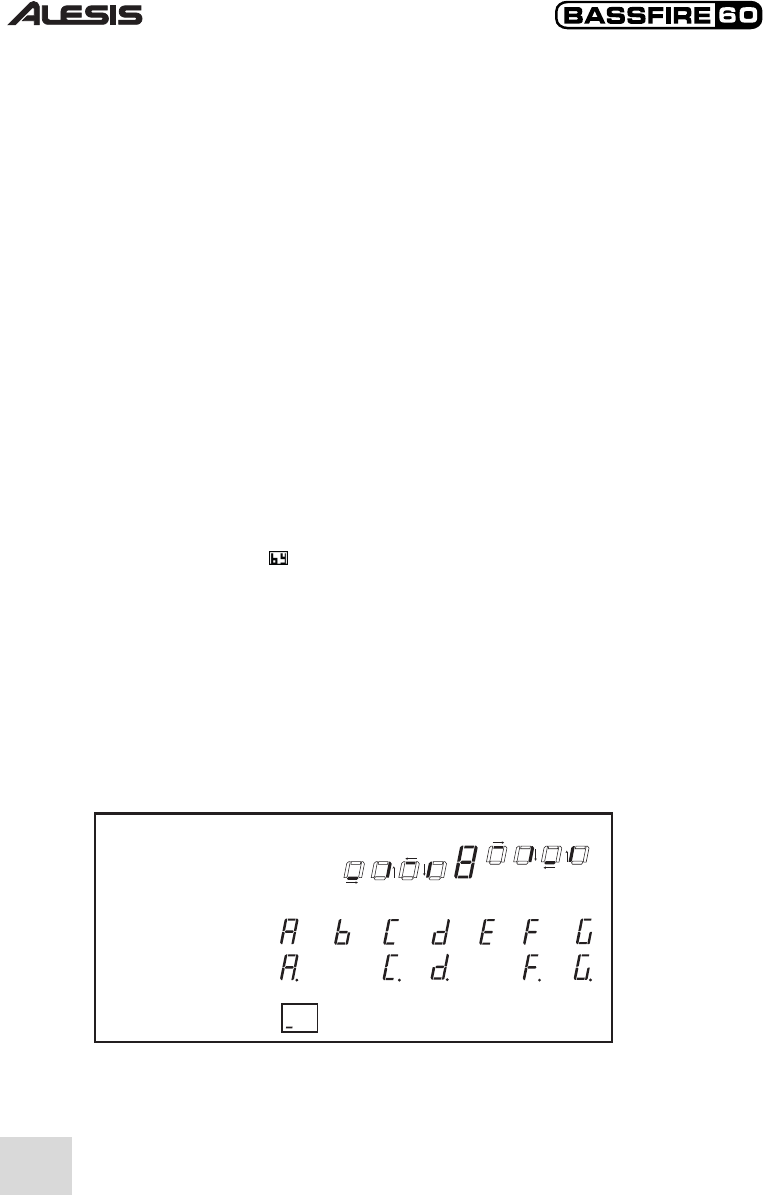
7
ROUTE
The order of the effects chain can be changed here.
This is the default order.
This one is the default order with FX2 and FX3 swapped to put the delay
effects in the middle of the modulation effects.
This order places the cabinet simulator at the end.
This one is order 2 with FX2 and FX3 swapped.
This order is the default order with the compressor/limiter placed at the
end, making this one ideal for recording.
This one is order 4 with FX2 and FX3 swapped.
This is the one to go for if you’re recording and want to sound like
you’re running several effects pedals into an amp.
This configuration is order 6 with FX2 and FX3 swapped.
Storing effects programs
After you’ve created a configuration that you like, you can store it for future recall.
To store your changes, press the VALUE knob and then turn the knob to select a
store location. Press the VALUE knob again to store the program.
Copying effects programs from one location to another
Copying programs is easy. Just call up the program that you want to copy. Then,
press the VALUE knob, twist it until you find the location where you want to store
your copy, and press VALUE again to store the program in its new location.
Restoring factory defaults for the effect settings
Once you have saved changes to a preset program, you can still recall the original
settings. To enter the RESTORE FACTORY PRESETS mode, simply hold down the
VALUE knob as you turn the unit on and then select the program to be restored
(or AL for all programs). Press the VALUE knob to confirm your selection. The
display will blink rapidly several times to indicate the restore was successful. Any
program changes you have made will be lost, so you might want to copy the
program to another location first.
To exit the RESTORE FACTORY PRESETS mode, just turn the EFFECTS knob.
You can also turn the Bassfire off and then on again, without holding down any
knobs or buttons, to exit the RESTORE FACTORY PRESETS mode.
8
Deferred program change
In normal operation, the Bassfire switches immediately to the program you select.
However, in some situations — especially when playing live — you may want the
ability to scroll through program numbers while remaining in the current program
setting. For example, if you’ve got a clean and chorusy bass sound stored in
program A3, and you want to switch next to a grungy sound stored in program C5,
you don’t want to have to hear all the programs in between. In these cases, use
the Bassfire’s Deferred Program Change mode.
While turning on the Bassfire, hold down either one of the Program Up or
Program Down buttons. Letters will scroll by on the display, spelling the word
“deferred.”
In this mode, you can scroll through program numbers without having the
program change each time. When you arrive at a program you want to use, press
the Program Up and Program Down buttons or both pedals at the same time in
order to switch to that program.
To exit Deferred Program Change mode, turn the Bassfire off, and then turn it
back on again without holding down any buttons.
Bypassing the effects
To bypass the effects section entirely, hold down both the Program Up and
Program Down buttons – or press both footswitches – for less than half a second.
The screen will read by ( ) to indicate that the effects have been bypassed.
You may now control the amplifier’s volume with the volume knob. Turning any
other knob restores the effects.
Using the built-in tuner
Press both the Program Up and Program Down buttons – or press both
footswitches at the same time – for more than half a second to enter both Bypass
and Mute mode.
Play the open string you wish to tune. Use the following guide when tuning:
Visual Guide to Tuning
The bottom four segments
rotate counterclockwise if
pitch is low. The top four
rotate
clockwise if pitch is high.
An 8 means pitch is in tune.
High
In tune
= no pitch detected
The twelve possible
pitches (a decimal point
indicates a sharp):
Low
